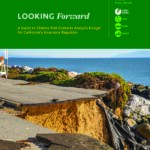CLEE’s Climate Risk Initiative researches and develops market based, regulatory and public policy tools to assist the insurance and financial industries in recognizing, addressing and responding to the risks caused by climate change. The Initiative harnesses the expertise of leading law faculty and students, researchers, and public and private sector leaders to develop high-impact market based, regulatory, and public policy approaches to address climate risk facing the insurance sector and the broader financial sector. It produces policy guidance for key decision-makers, creates a space to convene industry and other stakeholders for action-oriented discussion, promotes research to the public via events and media outreach, and serves as a resource to policy makers seeking to implement new and innovative tools.
Meet the Director
 As California Insurance Commissioner between 2011 and 2019, Dave Jones led pioneering efforts to address climate change and the risks it poses to the insurance sector. Under his leadership, the Department of Insurance launched the Climate Risk Carbon Initiative, a first-of-its-kind effort requiring major insurers to disclose their fossil fuel investments and requesting that they divest from thermal coal enterprises. Dave additionally spearheaded groundbreaking climate risk scenario analyses of insurers’ investment portfolios to assess the potential exposure to climate change related risks of trillions of dollars of insurer investments. He was also founding Chairperson of the Sustainable Insurance Forum, a working group of insurance regulators from across the globe developing best supervisory practices to address climate risk.
As California Insurance Commissioner between 2011 and 2019, Dave Jones led pioneering efforts to address climate change and the risks it poses to the insurance sector. Under his leadership, the Department of Insurance launched the Climate Risk Carbon Initiative, a first-of-its-kind effort requiring major insurers to disclose their fossil fuel investments and requesting that they divest from thermal coal enterprises. Dave additionally spearheaded groundbreaking climate risk scenario analyses of insurers’ investment portfolios to assess the potential exposure to climate change related risks of trillions of dollars of insurer investments. He was also founding Chairperson of the Sustainable Insurance Forum, a working group of insurance regulators from across the globe developing best supervisory practices to address climate risk.
Recent Publications & Events
April 2023
Scenario Analysis for California’s Insurance Regulator
California’s insurance industry faces significant risks from climate change, including both the transition risks facing all financial institutions as the global economy shifts toward decarbonization and the singular combination of physical risks–wildfire, drought, coastal hazards, extreme heat—that threaten California’s communities and businesses. Accurately assessing and mitigating these risks will be vital to ensuring the long-term viability of the insurance market in California, the availability and affordability of insurance for California residents and businesses, and the state’s physical and financial resilience in a changing climate.
CLEE’s report Looking Forward explores the field of climate risk scenario analysis—a key instrument to assess financial risk in projected future scenarios—and makes recommendations for the California Department of Insurance to design scenario analysis exercises and engage California insurance companies in forward-looking risk assessment.
December 2022
Comment Letter: Federal Insurance Office Climate Risk Data Call
The Federal Insurance Office (FIO) proposed in October 2022 to undertake a national survey of insurers to collect and analyze data on the impact of climate change on home insurance availability and affordability. Climate Risk Initiative director Dave Jones filed a formal comment letter supporting the critical need for FIO to undertake this climate risk survey, but also made specific recommendations to improve the survey to make sure it collects the data needed to provide a full picture of the impact of climate change on property insurance underwriting. Jones also urged FIO to separately undertake a survey of insurers in all market segments (property & casualty, life, health, etc) with regard to climate risks to the $8 trillion in investments held by US insurers.
October 2021
Developing Climate Risk Policy for State Procurement and Bond Issuance
California is home to one of the largest economies in the world, and the state plays a direct role in this economy as a steward of assets, a regulator, a revenue generator and service provider, and a direct spender of funds on a range of infrastructure, goods, and services. In light of the risks that climate change poses to state industries and financial institutions, state lawmakers and experts have recently sought to increase knowledge of climate-related risks throughout the state economy. In two new policy notes, CLEE explores potential opportunities to develop climate risk disclosure policy through the lens of state procurement and bond issuance. The policy notes include proposed legislative language to advance these risk disclosure concepts in state law.
Policy Note – Procurement and Climate Risk
Policy Note – Bonds and Climate Risk
Summer 2021
Developing Climate Risk Disclosure Policy for California
CLEE’s September 2020 California Roadmap recommended (among other actions to integrate climate risk and investment policy) that the state legislature require California corporations and financial institutions to disclose their climate-related financial risks to the state, potentially via the existing Task Force on Climate-Related Financial Disclosures (TCFD) framework. Disclosure by state corporations and financial institutions would help state leaders assess the risks facing the state’s economy, drive better decision-making by companies, regulators, and individual investors, and spur action around the country. Following publication of the Roadmap, CLEE researched and drafted legislative proposals to accomplish this disclosure requirement. Senate Bill 449, introduced in the 2020-2021 session, reflected CLEE’s proposals.
December 2020
Insuring Extreme Heat Risks
 Extreme heat is a leading climate-related health risk, responsible for thousands of deaths and hospitalizations per year in the United States, a number that will grow significantly this century. Local governments are developing resilience plans that include comprehensive extreme heat elements to help address the expansive risks posed by extreme heat, including not just physical health but also mental health, educational success, birth outcomes, worker productivity, transportation networks, and utility infrastructure. But extreme heat impacts are especially diffuse and difficult to address, and they disproportionately affect vulnerable and disadvantaged communities.
Extreme heat is a leading climate-related health risk, responsible for thousands of deaths and hospitalizations per year in the United States, a number that will grow significantly this century. Local governments are developing resilience plans that include comprehensive extreme heat elements to help address the expansive risks posed by extreme heat, including not just physical health but also mental health, educational success, birth outcomes, worker productivity, transportation networks, and utility infrastructure. But extreme heat impacts are especially diffuse and difficult to address, and they disproportionately affect vulnerable and disadvantaged communities.September 2020
The California Roadmap
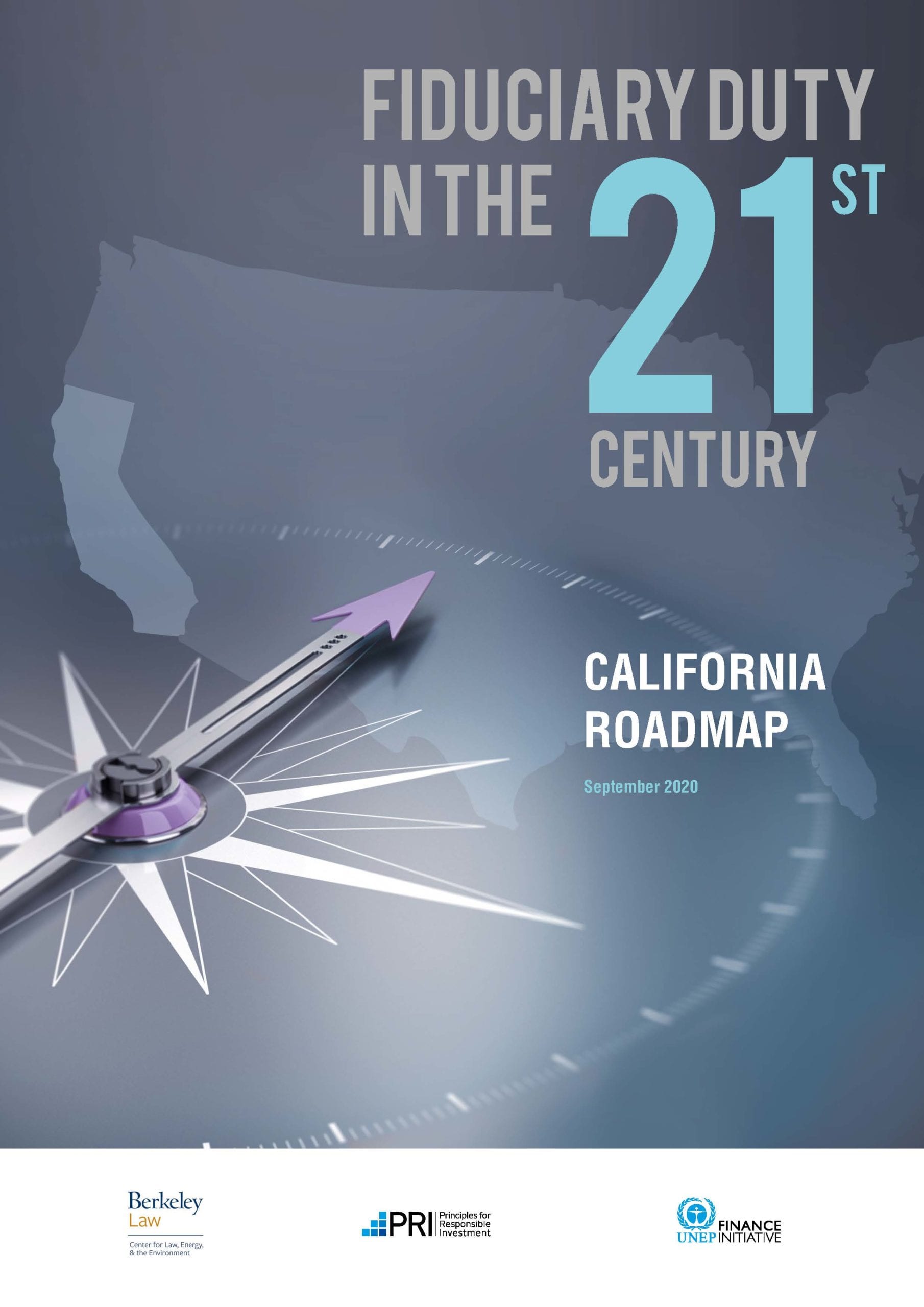 The increasingly clear impacts of climate change, the growing urgency of social justice movements, and the COVID-19 pandemic are all demonstrating how environmental, social, and governance (ESG) issues shape local and international economies. California, as one of the largest economies in the world and a hub of innovation in business as well as climate policy, is uniquely poised to lead the push for greater consideration of ESG issues.
The increasingly clear impacts of climate change, the growing urgency of social justice movements, and the COVID-19 pandemic are all demonstrating how environmental, social, and governance (ESG) issues shape local and international economies. California, as one of the largest economies in the world and a hub of innovation in business as well as climate policy, is uniquely poised to lead the push for greater consideration of ESG issues.January 2020
New Year’s Resolution for US Financial Regulators: It is well past time to act on climate
Dave Jones urges US financial regulators to incorporate climate risk into their policy in his recent op-ed in Responsible Investor.
August 2019
From Brussels to the Bay: Climate Risk and Sustainable Finance in the EU and California
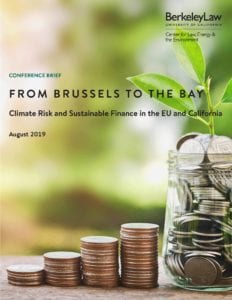 The global financial system faces structural risks from the worsening impacts of climate change and the various policy responses to it. As jurisdictions like the European Union (EU) and California seek to address these risks, they face significant questions about what actions will be necessary and how financial regulators and industry members across the globe will need to coordinate decision-making and resource-sharing.
The global financial system faces structural risks from the worsening impacts of climate change and the various policy responses to it. As jurisdictions like the European Union (EU) and California seek to address these risks, they face significant questions about what actions will be necessary and how financial regulators and industry members across the globe will need to coordinate decision-making and resource-sharing.
To address these concerns, we hosted experts and leaders in sustainable finance from California and the EU in May 2019 for a conference to discuss climate-related financial risks and key regulatory developments in the US and Europe. These include the EU Sustainable Finance Action Plan and Green Taxonomy efforts that seek to drive sustainable investment through innovative regulatory incentives and US industry partnership in implementing new disclosure and accounting standards. Our conference brief highlights the key insights delivered at the conference.
July 2019
California Climate Risk: Insurance-Based Approaches to Mitigation and Resilience
As climate change poses new and evolving risks for California residents and businesses, the insurance industry will play an increasingly important role in managing these risks. California is pursuing policies that mitigate greenhouse gas emissions and build resiliency to climate risks. Insurers have opportunities to address climate-related risks through innovation across their risk management, insurance, and investment activities, and through increased collaborative efforts.
California Climate Risk: Insurance-Based Approaches to Mitigation and Resilience provided a space to discuss these issues. The event was convened by California Insurance Commissioner Ricardo Lara in partnership with UN Environment’s Principles for Sustainable Insurance Initiative, UCLA School of Law’s Emmett Institute on Climate Change and the Environment, and UC Berkeley School of Law’s Center for Law, Energy, and the Environment.
March 2019
Insuring California in a Changing Climate: Adapting the Industry to New Needs, Risks, and Opportunities
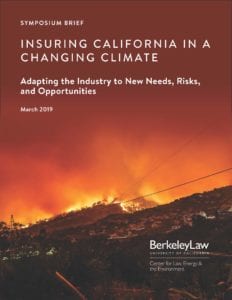 Climate change poses significant risks to the insurance industry, even as the industry has the opportunity to help California residents and businesses mitigate their own risks. As disaster events become more common and complex, markets transition away from fossil fuels, and climate litigation accelerates, the industry will need to adapt rapidly while Californians will need continued access to robust protection. Our new symposium brief highlights the key concerns and top policy and market solutions available to protect insurers and consumers alike.
Climate change poses significant risks to the insurance industry, even as the industry has the opportunity to help California residents and businesses mitigate their own risks. As disaster events become more common and complex, markets transition away from fossil fuels, and climate litigation accelerates, the industry will need to adapt rapidly while Californians will need continued access to robust protection. Our new symposium brief highlights the key concerns and top policy and market solutions available to protect insurers and consumers alike.
SEPTEMBER 2018
TRIAL BY FIRE: MANAGING CLIMATE RISKS FACING INSURERS IN THE GOLDEN STATE
Climate change presents unprecedented risks to the insurance industry,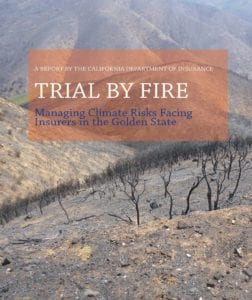 from increased wildfires and storm events to potential litigation and economic transitions. The industry faces these dynamic challenges at the same time that insurance products are becoming more necessary but less available and affordable.
from increased wildfires and storm events to potential litigation and economic transitions. The industry faces these dynamic challenges at the same time that insurance products are becoming more necessary but less available and affordable.
Our report, Trial by Fire, documents the nature and extent of the risks faced by insurers and residents in California and offers a range of recommendations to protect the industry and the entire state in a changing climate.
Climate Change Poses Risks for Financial Sector
Climate change poses significant physical, transition and liability risks to insurers, banks, and other firms in the financial sector and firms in the real economy. Insurers in particular face underwriting risks and losses associated with the physical impacts of climate change, such as more frequent and severe climate-related catastrophes, including wildfires, droughts, tornadoes, hurricanes, and floods. The 2017 and 2018 California wildfires, for example, resulted in record breaking loss of life, destruction of homes and businesses, and record breaking losses for home insurers. In addition, insurers as investors face transition risk — the risk that a transition away from greenhouse gas-emitting industries will reduce the value of investments insurers hold in those industries. Finally, insurers indirectly face liability risk: industries that contribute to climate change may be held liable at some point in the future by courts for damages due to climate change, which in turn could impose costs on insurers who provide liability insurance to those industries.
In general, too many firms in the real economy and the financial sector are not recognizing, evaluating, disclosing, or addressing these climate related risks. At the same time, some insurers are addressing climate change-related risks by ceasing to renew or write insurance for insureds facing those risks, which leaves businesses, homeowners and renters without financial mitigation for losses and creates demand for public policy responses. The financial sector’s delay in recognizing these climate risks and the failure to realign capital accordingly, away from climate change-causing industries and toward those which will reduce, adapt to, or mitigate climate change, poses significant financial regulatory and public policy challenges.
